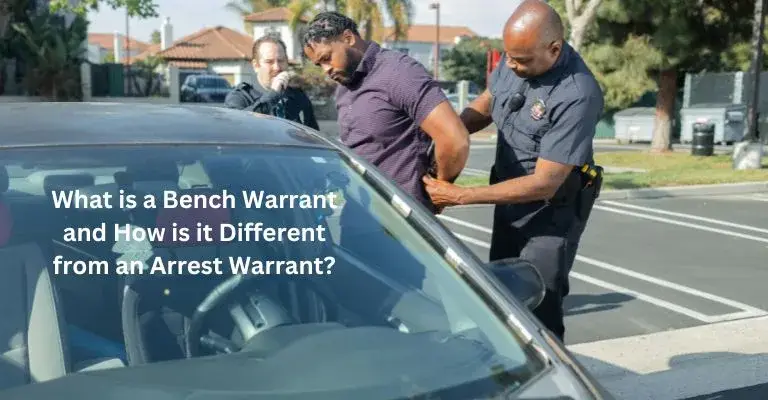You may have heard of the terms “bench warrant” and “arrest warrant” before, but do you know what they mean and how they differ? If not, don’t worry. In this article, I’ll explain everything you need to know about these two types of warrants, and why you should avoid getting one.

Table of Contents
ToggleWhat is an Arrest Warrant?
An arrest warrant is an order issued by a judge or a magistrate that authorizes the police to arrest a person who is suspected of committing a crime. The police must have probable cause to believe that the person is guilty of a specific offense, and they must present evidence to the judge or the magistrate to obtain the warrant.
An arrest warrant typically contains the following information:
- The name of the person to be arrested
- The crime that the person is accused of
- The date and place of the crime
- The amount of bail, if any
- The signature of the judge or the magistrate
An arrest warrant can be executed by any law enforcement officer who has the warrant or knows about it. The police can arrest the person at any time and place, as long as they have the warrant or a copy of it. However, there are some exceptions, such as when the person is in their home or a third-party’s home. In such cases, the police may need a search warrant or consent to enter the premises.
What is a Bench Warrant?
A bench warrant is a type of arrest warrant that is issued by a judge when a person fails to appear in court or comply with a court order. The term “bench” refers to the judge’s seat in the courtroom, and the warrant means that the person has to be brought before the judge.
A bench warrant can be issued for various reasons, such as:
- Failing to show up for a scheduled court date
- Failing to pay a fine or a fee
- Failing to complete a community service or a probation program
- Failing to obey a restraining order or a protective order
- Failing to testify as a witness or a juror
A bench warrant can also contain information such as the name of the person, the reason for the warrant, the amount of bail, and the signature of the judge. However, unlike an arrest warrant, a bench warrant does not require probable cause or evidence of a crime. It is based on the person’s violation of the court’s rules or authority.
A bench warrant can be executed by any law enforcement officer who has the warrant or knows about it. However, the police may not actively look for the person or make a priority of arresting them. Instead, they may wait until the person is stopped for a traffic violation, a routine check, or another reason. Then, they can run the person’s name through a database and see if there is a bench warrant for them. If there is, they can arrest the person and take them to court.
Peoples Also like;
How a Texas, Tyler Lawyer Scammed His Divorce Client Out of $235,000
What to Do After a Dog Bite: Is it Important to Hire a Dog Bite Lawyer
What are the Consequences of Having a Warrant?
Having either an arrest warrant or a bench warrant can have serious consequences for the person. Some of the possible outcomes are:
- Being arrested and taken to jail
- Having to pay a bail or a bond to get out of jail
- Having to appear in court and face the judge
- Having to pay additional fines or fees
- Having a criminal record or a mark on your background check
- Losing your driver’s license or your professional license
- Losing your job or your benefits
- Losing your custody or visitation rights
- Having difficulty traveling or applying for a visa
Therefore, it is important to avoid getting a warrant in the first place, or to resolve it as soon as possible if you have one. The best way to do that is to consult with a qualified criminal defense attorney who can advise you on your options and represent you in court.
FAQs
Here are some frequently asked questions and answers about warrants:
Q: How can I find out if I have a warrant?
A: You can check online databases, or call the local court or the police department and ask them. However, be careful, as some websites may charge you a fee or try to scam you. Also, calling the authorities may alert them of your location and lead to your arrest.
Q: How can I get rid of a warrant?
A: The best way to get rid of a warrant is to hire a lawyer and appear in court. Depending on the circumstances, your lawyer may be able to negotiate with the prosecutor, get the warrant quashed, or get the charges reduced or dismissed. Do not try to ignore or evade the warrant, as it will not go away and may only make things worse.
Q: What is the difference between a warrant and a summons?
A: A warrant and a summons are both legal documents that order a person to appear in court. However, a warrant allows the police to arrest the person, while a summons does not. A summons is usually issued for minor offenses, such as traffic tickets or civil lawsuits, and it gives the person a date and time to show up in court. A warrant is issued for more serious offenses, such as felonies or misdemeanors, and it does not specify a date or time for the court appearance.
Q: Can I travel with a warrant?
A: Traveling with a warrant is risky and not recommended. If you travel within the state or the country, you may be stopped by the police or the airport security and arrested. If you travel outside the country, you may have trouble getting a passport or a visa, or you may be detained or extradited when you return. Therefore, it is better to resolve your warrant before you travel.
Conclusion
A bench warrant and an arrest warrant are two types of warrants that authorize the police to arrest a person and bring them to court. An arrest warrant is based on probable cause and evidence of a crime, while a bench warrant is based on the person’s failure to appear in court or comply with a court order. Both warrants can have serious consequences for the person, such as being arrested, jailed, fined, or having a criminal record. Therefore, it is important to avoid getting a warrant or to resolve it quickly with the help of a lawyer.
I hope you found this article informative and helpful. If you have any questions or comments, please feel free to leave them below. Thank you for reading!
